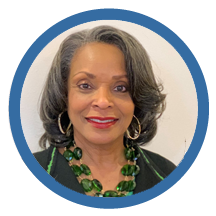Voices from the Region spotlights stakeholders in Region 11 and their work to improve educational opportunities and outcomes. R11CC is privileged to collaborate with and share the insights of Dr. Janice Garnett, a distinguished senior lecturer on educational leadership at the College of Education, Health, and Human Sciences at the University of Nebraska Omaha. The Omaha native is a veteran educator with previous roles as an elementary teacher, a central office administrator in curriculum and professional development, a summer school principal, a human resources coordinator, and an assistant superintendent of human resources. Dr. Garnett is an advisor to the Region 11 Comprehensive Center and a partner with the center’s Nebraska project to support multilingual learner outcomes in schools receiving targeted support.
 Tell us more about your professional role, responsibilities, and goals in your current position.
Tell us more about your professional role, responsibilities, and goals in your current position.
My responsibilities include teaching, service, and research. I teach graduate and doctoral-level courses at the university as an educational leadership (EDL) faculty member. In addition, I am a member of the Diversity, Equity, Access, and Inclusion (DEAI) Committee, as well as one of the training facilitators for faculty search committees. And lastly, I mentor new faculty on campus.
My “why” and my goals are very similar. I wanted to teach and inspire others the way my exceptional preK–12 and college teachers inspired me. I know that leadership is very complex work and has a range of purposes, so my goal is to effectively prepare future leaders to lead in today’s world. My personal goal is to place an emphasis on being an instructional leader. Instructional leaders empower teachers to become leaders themselves. I’m a huge advocate of teacher leadership—and distributing the weight of school responsibilities more equitably, while providing a model of teamwork for students to mirror.
What’s your educational background, and what drew you to this work?
I am an educator through and through. I have earned three degrees from the University of Nebraska at Omaha: a bachelor’s degree in elementary education, with a minor in early childhood education; a master’s degree in administration and supervision; and a doctorate in educational leadership, with a superintendent certification.
As a teenager, I volunteered in day camps during the summer and at a preschool while attending high school and college. So I really did love working with youth at an early age. It was a natural flow for me to explore a career serving young people. My journey moved from focusing on students as a teacher to teachers as a central office leader and then to administrators in a senior executive position.
How has the Comprehensive Center supported your work?
The Comprehensive Center provides resources for my leadership development and instruction courses. One of the resources is Supporting Students in Poverty with High-Impact Instructional Strategies. In this graduate course, we explore how leaders can create the conditions to support teachers using high-impact instructional strategies; this guide is one of the tools reviewed.
When I was first contacted about the R11CC project, I wasn’t sure what higher education could do. But I now understand that we have a role. I commend Dr. Shirley Vargas and Dr. Deborah Frison for contacting University of Nebraska Omaha for higher education representation. As leaders in the field leading the development of others, we must be aware of what’s happening at the state level, hence, making sure that our students are in the know. I see myself on the outside helping those individuals on the inside be more aware of what’s happening and able to hit the ground running if they can be involved.
Dr. Vargas is a guest speaker in one of my graduate classes. She provides pertinent information regarding the Nebraska Department of Education (NDE) and the partnership with R11CC, the focus on the needs of multilingual learners, and the school improvement focus for the state. Through this interactive discussion, students learn about targeted support and improvement and the additional targeted support for schools and districts. This discussion keeps us focused on equity-minded practices. Students understand the importance of examining and inquiring about subgroups as they work in their classrooms or as teacher leaders. It’s a great conversation to discuss intentionally creating relationships beyond the classroom, beyond the school, and beyond the school district walls to support our students because we can’t do this work in isolation. Dr. Vargas shares strategies to meet the needs of different subgroups. The multilingual learners’ project is essential to impact the schools implementing the strategies. Hopefully, it will be scaled up for other schools to participate and learn from the pilot.
I believe partnerships in our community help us to get into action. That might mean that we have a deep commitment to making changes that ensure success for all students to have quality learning opportunities. We’ll continue to move equity from words to actions. R11CC’s multilingual project is a great example to replicate in the future.
What I also love about the project is that it cultivates teachers and leaders who utilize data to inform their instruction and school improvement decisions. As we progress, the targeted assistance program associated with this project will have long-term outcomes for students, schools, and districts.
What does success look like for your schools and students?
I am certain that at this university, we are making a difference and developing leaders who will make a difference in our schools. Our impact is ensuring our students graduate knowing a school’s success is largely determined by the effectiveness of its principal or leader. Equally important is success in terms of our students leaving our program, purposefully leading for equity, and meeting the needs of all students.
This interview was featured in the R11CC Spring-Summer 2023 newsletter.
